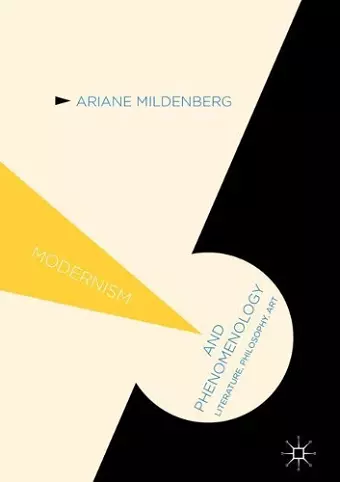Modernism and Phenomenology
Literature, Philosophy, Art
Format:Hardback
Publisher:Palgrave Macmillan
Published:18th Apr '17
Currently unavailable, and unfortunately no date known when it will be back

"Modernism and Phenomenology brilliantly reveals the "epiphanic moments" at the heart of mundane experience, moments that rupture taken-for-granted ways of perceiving and that lead us to interrogate anew the world revealed through them. Creatively interlacing original readings of Modernist writers and artists including Woolf, Stein, Stevens, Hopkins, Kafka, Cezanne, and Klee with important phenomenological insights offered by Husserl, Heidegger, Merleau-Ponty and their interlocutors, Mildenberg brings modernism and phenomenology into a sustained, and extremely productive conversation that is long overdue. "Both phenomenology and modernism" she persuasively demonstrates, "thrive in the blend of insecurity and possibility." In an aesthetic, literary, and philosophical tour de force, Mildenberg carries her readers alongside her as she wades deep into this fertile realm of "prelogical muddiness," or "wild being": the flesh of the world whose waves and folds comprise infinite material for creative expression." (Gail Weiss, The George Washington University, USA)
Close readings of works by Paul Cézanne, Gertrude Stein, Franz Kafka, Gerard Manley Hopkins, Wallace Stevens, Paul Klee, and Virginia Woolf explore how modernist texts and artworks display a deep-rooted openness to the world that turns us into "perpetual beginners."
Braiding together strands of literary, phenomenological and art historical reflection, Modernism and Phenomenology explores the ways in which modernist writers and artists return us to wonder before the world. Taking such wonder as the motive for phenomenology itself, and challenging extant views of modernism that uphold a mind-world opposition rooted in Cartesian thought, the book considers the work of modernists who, far from presenting perfect, finished models for life and the self, embrace raw and semi-chaotic experience. Close readings of works by Paul Cézanne, Gertrude Stein, Franz Kafka, Gerard Manley Hopkins, Wallace Stevens, Paul Klee, and Virginia Woolf explore how modernist texts and artworks display a deep-rooted openness to the world that turns us into "perpetual beginners." Pushing back against ideas of modernism as fragmentation or groundlessness, Mildenberg argues that this openness is less a sign of powerlessness and deferred meaning than of the very provisionality of experience.
“In Modernism and Phenomenology philosophical, literary and art historical strands are verflochten into a unique and original tapestry that offers new ways of thinking about some of the crucial questions at the heart of modernist work. … In gathering and rigorously analysing such a range of material Mildenberg has done a great service to modernist studies … . Her rigorously researched and generous book represents an invaluable thread in the tapestry of modernist criticism, a strand that will hopefully be braided further by literary scholars.” (Imola Nagy-Seres, Modernist Cultures, Vol. 15 (2), 2020)
“The strengths of Ariane Mildenberg’s study are undeniable. It is precise in its handling of phenomenological concepts while steering clear of technical complexities, and thus remaining perfectly accessible to the uninitiated.” (Xavier Le Brun, Études britanniques contemporaines, Vol. 57, 2019)
''The exultant final chapter of Ariane Mildenberg’s Modernism and Phenomenology is an upbeat and celebratory interrogation of the doubleness of experience and its expression. ... This core doubleness of interrogative openness to the strangeness of experience is explored as the heart of both modernism and phenomenology and the book does an excellent job of tracing this pulse in the work of Husserl, Heidegger and Merleau-Ponty and showing how it beats in time with many of the central texts and paintings of modernism'' (Eoghan Walls, The Oxford Literary Review, Vol. 40 (2), 2018)
ISBN: 9780230289369
Dimensions: unknown
Weight: 3645g
183 pages
1st ed. 2017